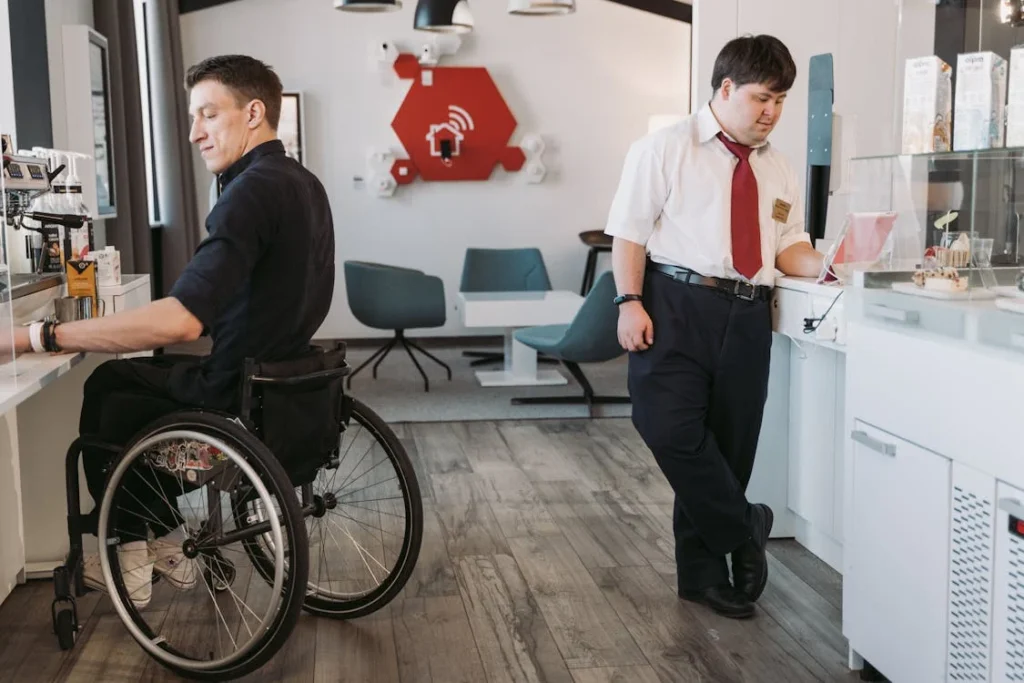Finding a job can be challenging for anyone, but for people with disabilities in India, the process often comes with extra hurdles. Many job seekers face accessibility barriers, lack of inclusive hiring practices, and employers who are unaware of their rights under the law. However, things are changing. More companies are recognizing the value of hiring people with disabilities, and government policies are in place to ensure fair opportunities.
Knowing where to look for jobs, how to present your skills, and how to request accommodations can make a big difference in your job search. Employers are looking for talented professionals, and having a disability should never stop you from achieving your career goals.

Understanding Your Rights as a Job Seeker with a Disability
Before applying for jobs, it is important to know your rights. The Rights of Persons with Disabilities (RPWD) Act, 2016 protects people with disabilities from discrimination in hiring and ensures they have equal opportunities in the workplace.
This law applies to both government and private sector jobs, making it illegal for employers to deny someone a job solely because of their disability.
Reservation of Jobs for People with Disabilities
Government jobs in India have 4% reservation for people with benchmark disabilities, which include visual impairment, hearing impairment, locomotor disability, autism, and other conditions recognized under the law.
This means that if you meet the qualifications for a government position, you have a fair chance of being selected through the reservation system.
Many government job postings specify which positions are reserved for people with disabilities, so it is important to check eligibility criteria before applying.
Private companies are not legally required to reserve jobs for people with disabilities, but many are choosing to do so voluntarily. Businesses are realizing that hiring people with disabilities brings diversity and new perspectives to the workplace.
Many multinational companies and Indian corporations have inclusive hiring policies, providing opportunities across different fields.
Workplace Accessibility and Accommodations
The law also requires workplaces to be accessible. If you are hired, your employer must provide reasonable accommodations to help you perform your job effectively.
This could include wheelchair-accessible workspaces, screen readers for visually impaired employees, sign language interpreters, or flexible work hours if needed.
When applying for a job, you have the right to ask about workplace accessibility. Many companies already have policies in place, but if they do not, you can request adjustments during the hiring process.
Employers cannot refuse to hire you just because you need accommodations, as long as you are capable of performing the job duties with those adjustments.
Protection Against Discrimination
If you experience discrimination in the hiring process—such as an employer refusing to interview you because of your disability—you have legal options.
You can file a complaint with the Chief Commissioner for Persons with Disabilities (CCPD) or approach the State Commissioner for Persons with Disabilities. These authorities investigate cases and ensure that companies follow disability rights laws.
Being aware of your rights will help you approach the job search with confidence. Knowing that you are protected by law ensures that you can demand fair treatment and not settle for workplaces that are not inclusive.

Finding Job Opportunities as a Person with a Disability
A successful job search begins with knowing where to look. While traditional job portals list opportunities, not all of them cater to people with disabilities.
Fortunately, there are several platforms, organizations, and government initiatives that focus on inclusive employment. Understanding where to apply and how to connect with disability-friendly employers can make your job search more effective.
Exploring Government Job Portals and Recruitment Programs
For those looking for government jobs, the National Career Service (NCS) portal, run by the Ministry of Labour and Employment, provides listings specifically for persons with disabilities.
Many government departments release vacancy notifications with reserved positions, and these can often be found on official websites of public sector units (PSUs), state government portals, and employment exchanges.
The Unique Disability ID (UDID) card can also be helpful when applying for government jobs. This ID serves as proof of disability and ensures that candidates can claim reservations where applicable.
Some recruitment exams, such as the UPSC and SSC exams, provide specific accommodations like extra time and scribe assistance, making it easier for candidates with disabilities to participate.
Leveraging Disability-Inclusive Job Portals
Several online job platforms focus on connecting employers with job seekers who have disabilities. These platforms work with companies committed to inclusive hiring and offer job listings tailored for different types of disabilities.
Organizations such as Enable India, Sarthak Educational Trust, and Youth4Jobs provide training, job matching, and direct employer connections.
Many multinational companies have dedicated sections on their career pages highlighting their commitment to disability inclusion.
Companies in the IT, banking, retail, and hospitality sectors are increasingly adopting inclusive hiring practices, making these industries good options for job seekers with disabilities.
Connecting with NGOs and Skill Development Programs
Non-governmental organizations (NGOs) play a significant role in bridging the gap between job seekers and employers. They provide career counseling, soft skills training, technical education, and placement assistance.
Some NGOs also help candidates prepare for job interviews and improve workplace readiness.
Skill development programs run by organizations like the National Skill Development Corporation (NSDC) offer vocational training for persons with disabilities in fields like customer service, digital marketing, data entry, and manufacturing.
These programs help job seekers build the skills required for a variety of roles and increase their employability.
Networking and Reaching Out to Employers
Networking is an important part of finding a job. Reaching out to friends, family, and former colleagues can lead to job referrals.
Many companies also participate in job fairs and recruitment drives specifically for persons with disabilities, providing a great opportunity to connect directly with employers.
Social media platforms like LinkedIn can be useful for showcasing skills, sharing professional achievements, and finding inclusive employers. Many companies now actively search for candidates online, so keeping an updated LinkedIn profile can improve visibility to recruiters.
Finding the right job requires a mix of research, preparation, and networking. By exploring multiple channels and applying to inclusive employers, job seekers with disabilities can improve their chances of securing meaningful employment.

Preparing for the Job Application Process
Applying for a job as a person with a disability requires careful preparation to ensure that your qualifications, skills, and experience stand out. Employers are looking for talented candidates who can contribute to their company’s success.
Presenting yourself effectively through a strong resume, a well-written cover letter, and confident interview skills can make a significant difference in securing a job.
Crafting a Strong Resume
A resume is the first impression an employer has of you, so it should highlight your strengths, experience, and achievements. It is important to focus on your skills and how they align with the job you are applying for.
Emphasizing relevant work experience, internships, certifications, and educational qualifications can help employers see your potential.
A well-structured resume should start with a summary that briefly describes your expertise and career goals. Following this, list your work experience, starting with the most recent job or internship.
Include clear descriptions of your responsibilities and accomplishments. If you have received any awards, recognition, or special training, mention them as well.
For fresh graduates or those with limited work experience, highlighting transferable skills from volunteering, academic projects, or training programs can strengthen the resume.
Employers value problem-solving skills, communication abilities, and technical expertise, so showcasing these aspects can improve your chances.
Writing an Effective Cover Letter
A cover letter gives you the opportunity to introduce yourself in more detail and explain why you are a good fit for the job. It should be customized for each position you apply for, addressing how your skills match the company’s needs.
Start by expressing your interest in the role and the company. Researching the employer and mentioning specific reasons why you want to work there can show enthusiasm and effort.
The next section should highlight your skills and experience, focusing on how they will benefit the organization. Providing examples of past work achievements can make your application more compelling.
If you choose to disclose your disability, do so in a way that highlights your ability to perform the job effectively. Some applicants prefer to mention any workplace accommodations they might need, while others wait until later in the hiring process.
The decision to disclose is personal, and there is no right or wrong approach.
Preparing for Job Interviews
Once an employer is interested in your application, the next step is the interview. This is your chance to demonstrate your abilities and personality. Preparing in advance can help build confidence and ensure a smooth conversation with the interviewer.
Researching common interview questions and practicing responses can be beneficial. Employers often ask about previous work experiences, challenges faced, and how candidates handle responsibilities.
Thinking through examples of teamwork, leadership, and problem-solving situations can help create strong responses.
If you require accommodations for the interview, such as wheelchair access, sign language interpretation, or extra time for written tests, it is best to inform the employer in advance. Most companies are willing to make arrangements to ensure a fair interview process.
Dressing professionally, arriving on time, and maintaining good communication are important factors in making a positive impression. Answering questions clearly, showing enthusiasm, and demonstrating knowledge about the company can leave a lasting impact.
Interviews also provide an opportunity to ask questions about the company’s work culture, accessibility policies, and career growth opportunities. Employers appreciate candidates who show genuine interest in the organization.
Following Up After an Interview
After an interview, sending a thank-you email to the interviewer can reinforce your interest in the position. This email should be short and professional, thanking the interviewer for their time and expressing enthusiasm about the role.
If any accommodations or follow-up steps were discussed, this is also a chance to confirm details.
If you do not receive a response within a reasonable time, following up with the employer shows persistence and interest. Even if you are not selected for the role, maintaining a professional attitude can leave the door open for future opportunities.

Overcoming Challenges in the Job Search Process
While job opportunities for people with disabilities in India are increasing, the journey to securing a job can still come with challenges.
Many job seekers encounter barriers related to employer biases, accessibility limitations, and lack of awareness about inclusive hiring policies. Understanding these challenges and developing strategies to overcome them can make the job search process more effective.
Addressing Employer Bias and Misconceptions
One of the most common challenges faced by job seekers with disabilities is employer bias. Many hiring managers may have misconceptions about productivity, workplace adjustments, and the costs of accommodations.
Some employers may assume that employees with disabilities will require expensive modifications or that they will not be able to perform at the same level as other employees.
Overcoming these biases starts with confidence in your own abilities. Clearly presenting your skills, achievements, and qualifications during the application process helps shift the focus from disability to capability.
During interviews, emphasizing past work experiences, problem-solving skills, and adaptability can challenge negative assumptions. Sharing success stories or examples of how you have effectively managed responsibilities in previous roles can be persuasive.
Networking can also help break down biases. When employers receive recommendations from trusted sources—such as mentors, past colleagues, or professional organizations—they are more likely to focus on skills rather than assumptions.
Attending industry events, job fairs, and networking sessions can open doors to employers who are already committed to diversity and inclusion.
Dealing with Limited Accessible Workspaces
Despite legal requirements for workplace accessibility, many office spaces in India are still not fully accessible. This can create difficulties for job seekers who need wheelchair access, assistive technology, or other modifications to perform their jobs effectively.
When considering job opportunities, it is important to research the employer’s accessibility policies. Some companies openly share their commitment to disability inclusion on their websites, highlighting workplace accommodations and support programs.
If accessibility information is not available, job seekers can reach out to HR representatives to inquire about workplace adjustments.
If an office space is not fully accessible, discussing remote work options or alternative job arrangements can be helpful. Many companies are now open to hybrid or work-from-home models, allowing employees with disabilities to work comfortably without physical barriers.
Managing the Emotional Impact of Job Rejections
Job hunting can be a stressful process, and receiving rejections can feel discouraging. For job seekers with disabilities, the experience can be even more challenging if they suspect that their disability played a role in an employer’s decision.
Building resilience is key to maintaining motivation. Not every job opportunity will be the right fit, and rejection does not reflect an individual’s abilities or worth.
Seeking feedback from interviewers can provide insights into areas for improvement, whether it is refining interview techniques, gaining additional skills, or improving resume presentation.
Surrounding yourself with a strong support network—whether it is family, friends, mentors, or disability advocacy groups—can provide encouragement and guidance.
Speaking to others who have successfully navigated similar challenges can offer valuable strategies and reassurance.
Using Self-Employment and Entrepreneurship as an Alternative
For some job seekers with disabilities, traditional employment may not be the best option due to accessibility issues or limited opportunities in certain industries. In such cases, exploring self-employment and entrepreneurship can provide an alternative path to career success.
Starting a small business, freelancing, or working as a consultant allows individuals to create their own work environment based on their needs.
Many organizations and government programs support entrepreneurs with disabilities through funding, training, and mentorship programs.
Platforms like the Startup India Initiative and the National Handicapped Finance and Development Corporation (NHFDC) offer resources for aspiring entrepreneurs.

Navigating Career Growth and Long-Term Success
Securing a job is just the beginning. Building a successful career requires continuous learning, adaptability, and professional development.
For employees with disabilities, career growth may come with unique challenges, but with the right approach, it is possible to advance in your chosen field and achieve long-term success.
Developing Skills for Career Advancement
In a fast-changing job market, acquiring new skills is essential for career growth. Many industries now require employees to stay updated with the latest technologies and trends.
Job seekers and working professionals with disabilities can benefit from online courses, certifications, and skill development programs that enhance their expertise.
Government-backed initiatives like the Skill Council for Persons with Disability (SCPwD) offer training in various fields, helping individuals develop industry-specific skills.
Many companies also provide professional development programs that allow employees to expand their knowledge while working. Taking advantage of these resources can improve career prospects and open doors to new opportunities.
Seeking Mentorship and Networking Opportunities
Having a mentor can be a game-changer in career development. A mentor—whether a senior colleague, industry expert, or professional coach—can provide guidance, career advice, and insights into workplace dynamics.
Many organizations and NGOs offer mentorship programs that connect job seekers and employees with professionals who can help them navigate career challenges.
Networking also plays a vital role in career advancement. Attending industry events, participating in professional forums, and engaging with peers on platforms like LinkedIn can lead to new job opportunities and valuable connections.
Many companies now have Employee Resource Groups (ERGs) for persons with disabilities, providing a supportive space for networking and professional growth.
Advocating for Inclusive Workplace Policies
Employees with disabilities can contribute to shaping workplace inclusion by advocating for better accessibility, fair promotions, and equal opportunities.
Engaging in discussions with HR teams, suggesting policy improvements, and participating in inclusion programs can help create a more welcoming work environment for future employees.
Companies with strong diversity and inclusion policies are more likely to promote employees based on merit rather than unconscious biases.
If a workplace lacks clear career progression plans for employees with disabilities, discussing performance metrics and growth opportunities with managers can help establish a roadmap for advancement.
Exploring Leadership Roles
Climbing the career ladder is possible for employees with disabilities when companies recognize and reward talent fairly.
Aspiring for leadership positions requires developing management skills, gaining experience in decision-making roles, and demonstrating the ability to lead teams.
Employees with disabilities should actively seek out leadership training programs, apply for internal promotions, and take on projects that showcase their ability to contribute beyond their current roles.
Many companies offer leadership development courses, and expressing interest in such programs can create pathways to senior positions.
Planning for Long-Term Career Stability
Career stability is achieved through financial planning, continuous learning, and professional adaptability. Employees should explore long-term career goals, considering whether they want to grow within a company, switch industries, or even start their own business in the future.
Building a strong professional reputation, maintaining a robust skill set, and staying updated on industry developments ensures that career opportunities continue to expand over time.
Employers value employees who are proactive, adaptable, and committed to professional excellence, regardless of their physical abilities.

The Role of Employers in Supporting Job Seekers with Disabilities
While job seekers with disabilities must take proactive steps in their job search and career growth, employers also have a responsibility to create an inclusive hiring process and work environment.
A disability-friendly workplace benefits not just employees with disabilities but the entire organization, fostering a culture of diversity, innovation, and equal opportunity.
Creating Inclusive Hiring Practices
Employers play a critical role in ensuring that candidates with disabilities have equal access to job opportunities. This starts with making job postings more inclusive.
Many job descriptions unintentionally discourage applicants with disabilities by emphasizing physical requirements that are not essential for the role.
Companies that focus on skills, experience, and qualifications rather than physical abilities attract a wider pool of talented applicants.
Application processes should also be accessible. Many companies use online job portals that may not be compatible with assistive technologies like screen readers or voice commands.
Employers must ensure that digital hiring platforms accommodate various needs so that applicants with disabilities can complete the process without unnecessary barriers.
During the interview stage, companies should be open to providing accommodations such as wheelchair-accessible venues, sign language interpreters, or extended time for written assessments.
Demonstrating a commitment to accessibility during recruitment sets a positive tone and encourages candidates with disabilities to apply with confidence.
Implementing Workplace Adjustments and Assistive Technology
Once hired, employees with disabilities must have access to reasonable workplace adjustments that allow them to perform their jobs effectively.
This could include providing ergonomic seating, accessible office layouts, screen readers, speech-to-text software, or remote work options for those with mobility challenges.
Many accommodations are simple and inexpensive, yet they significantly improve productivity and job satisfaction. Employers should work closely with employees to identify their specific needs and implement adjustments that enhance their ability to work comfortably.
Technology is a powerful tool for workplace inclusion. Companies that integrate assistive technology—such as braille displays,
AI-powered communication tools, and adaptive workstations—create an environment where employees with disabilities can contribute at the highest level.
Many of these tools are already built into mainstream software, making it easier for companies to adopt them without major costs.
Encouraging an Inclusive Work Culture
A truly inclusive workplace is one where employees with disabilities feel respected, valued, and included in all aspects of work life. This requires disability awareness training for all employees to help break down biases and misconceptions.
Many people are unsure how to interact with colleagues who have disabilities, and training programs help foster a respectful and understanding work environment.
Creating employee support groups can also provide a sense of belonging. Many large organizations now have Employee Resource Groups (ERGs) focused on disability inclusion, offering networking opportunities, mentorship, and a platform for employees to share their experiences.
Inclusion must go beyond policies and training. Employers should actively ensure that employees with disabilities are considered for promotions, leadership roles, and professional development programs.
Career growth should be based on performance and potential, not on assumptions about ability.
The Business Case for Disability Inclusion
Employers who invest in disability inclusion benefit from increased workplace diversity, improved employee engagement, and access to a broader talent pool.
Studies have shown that companies with strong diversity and inclusion policies outperform competitors, as diverse teams bring fresh perspectives and innovative problem-solving approaches.
By hiring people with disabilities, companies also strengthen their reputation as socially responsible organizations. Many global businesses now prioritize working with inclusive employers, and companies in India that lead in accessibility will gain a competitive edge in the market.
A workplace that embraces disability inclusion is not just following legal guidelines—it is fostering an environment where every employee has the opportunity to succeed. Employers who take this responsibility seriously contribute to a stronger, more equitable workforce for the future.
Conclusion
Applying for jobs as a person with a disability in India comes with challenges, but with the right approach, preparation, and awareness of your rights, you can build a successful career. Knowing where to find inclusive job opportunities, preparing a strong application, and confidently presenting your skills to employers can help you navigate the job market effectively.
Employers are increasingly recognizing the value of a diverse workforce, and many companies are improving their hiring practices and workplace accessibility. Job seekers must advocate for their needs, seek skill development opportunities, and leverage networking to connect with inclusive employers.
Long-term career growth depends on continuous learning, mentorship, and seeking leadership opportunities. Employees with disabilities should not just focus on securing a job but also on advancing within their field.
A truly inclusive workforce benefits everyone—employees, businesses, and society. By taking proactive steps, job seekers with disabilities can achieve meaningful employment, and employers can create workplaces where all individuals, regardless of ability, can thrive. The future of work in India is becoming more accessible, and now is the time to take the next step in your career journey.




This blog is really helpful for people with disabilities looking for jobs in India. It’s great to see platforms making job search easier. I also recommend Salarite – it lists safe and verified jobs, especially helpful if you’re looking for a job in Jaipur for female professionals or flexible roles across India. 👍